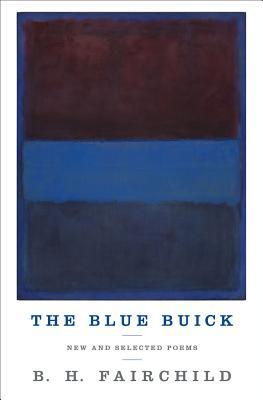I first encountered the poetry of B.H. Fairchild when I chose to review Early Occult Memory Systems of the Lower Midwest (2003). Despite its odd, even off-putting title, which seems to extrude tendrils of the New Age, the book was—is—one of the best original collections of contemporary poetry I’ve read. It proceeded to win the National Book Critics Circle Award, and its 30-page pièce de résistance, “The Blue Buick,” has become the most famous American narrative poem since the heyday of Stephen Vincent Benet and Robinson Jeffers, neither of whose work it resembles much at all. That’s probably why it lends Fairchild’s retrospective collection its title, though it is otherwise central to his work.
“The Blue Buick” is autobiographical, the story of an absolutely crucial friendship in the life of an intelligent, literarily inclined youngster in Liberal, Kansas, in the early 1960’s. The young man’s father runs a machine shop that repairs the pipes used for drilling oil—until the diamond core supersedes the old tri-cone bit (“You know what that is?” father says to son. “Well, that’s the end of the story.”) One of his last employees is “the best machinist I’ve ever seen.” North Texan Roy Eldridge Garcia has been places—Paris, New York, Hollywood—and met James Baldwin, the avant-garde modernist poet Blaise Cendrars (who’d lost an arm in the Great War), screenwriter-director Robert Rossen, and Maria, a would-be dancer whom he married and whose final teacher, Bronislava Nijinska, “gave her / the Buick, a gift from a rich patron, as a kind / of tacit consolation” for persuading Maria to abandon her dreams.
The father makes the son Roy’s apprentice, “to learn from him but also / to look out for him” because Roy is epileptic. Friendship blooms, and the young man devours the philosophers, writers, classical music, jazz, and art Roy and Maria prized, including the architectural mnemonics of Giordano Bruno (those occult memory systems of the title of Fairchild’s award-winner). “So I remembered / everything,” he says, which included, too, “the trip to Amarillo when Patsy Cline performed, / even the hometown ball games.” Roy and Maria gave the narrator-remembrancer his context within the greater context for which he yearned, showed him the wholeness, the possible integrity of human experience.
I hope I’ve given away enough about this rich and drily sweet poem to encourage you to read it; I assure you I haven’t given too much. As it figures centrally in Early Occult Memory Systems, so it stands in this book. The poems written before it are mostly set on the northern edge of the Panhandle and environs and filled with the characters and the predicaments of Fairchild’s early life. Those from his first two collections, The Arrival of the Future (1985) and Local Knowledge (1991), play with various voices (one, “There Is Constant Movement in My Head,” is that of a young dancer, an avatar of Maria, perhaps) and poetic forms and manners—meter, rhyme, stanza—that Fairchild seems to have mastered well before these particular poems, in which slant rhyme, consonance, assonance, alliteration, and even caesura figure musically. Well before “The Blue Buick,” Fairchild achieved the kind of poetic everyday speech that has been an aspiration of modernism ever since the fruitful friendship of Robert Frost and Edward Thomas.
The later poems’ strengths are technically those of their predecessors. Thematically, the newer poems sometimes are not autobiographical in incident and setting. In them, such figures as Ludwig Wittgenstein, the barber from Bertrand Russell’s famous paradox, the poet Hart Crane (via postcards written at sea the day before his suicide), a 1950’s Jewish seminary student and the same man three days after September 11, and Rasputin’s daughter speak. More personal pieces are polished but strike me as a bit generic: an evening-after September 11 poem set in Fort Worth while watching King Lear outdoors, a loose terza rima elegy for a pet gerbil, “The Left Fielder’s Sestina,” “On the Death of Small Towns: A Found Poem (from the Seymour Daily Tribune, Seymour, Indiana).”
The book ends well enough, though, with “Poem,” a revision of “The Problem” from Early Occult Memory Systems of the Lower Midwest. Its last stanza stands as a true last word about how Fairchild regards and would have us regard the world:
So in the cathedral of the world
we hold communion,
the bread of language
placed delicately upon our tongues
as we breathe the bitter air,
drinking the wine of reason
while lost, still, in the mysterium of Being.
[The Blue Buick, by B.H. Fairchild (New York: W.W. Norton & Co.) 368 pp., $29.95]



Leave a Reply